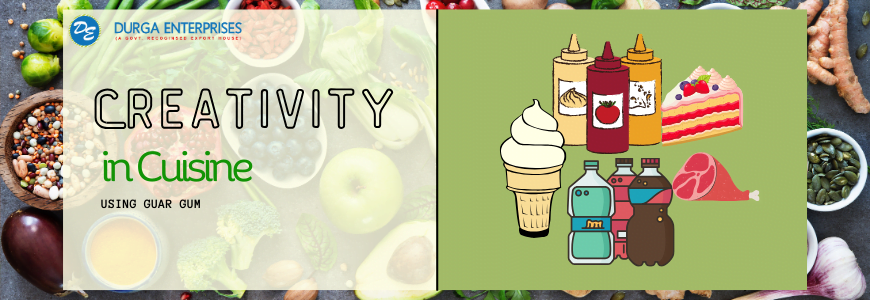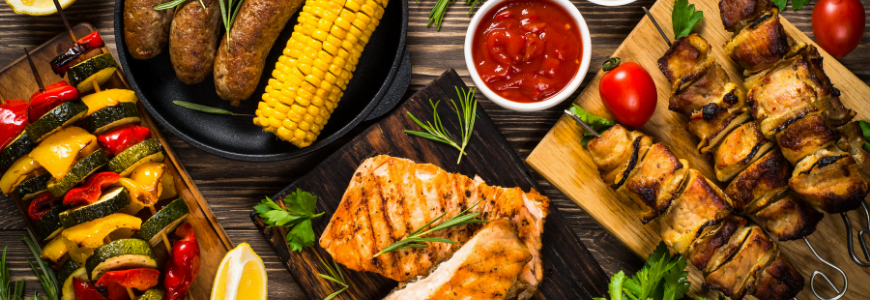Guar gum is a galactomannan polysaccharide derived from the seeds of the guar plant (Cyamopsis tetragonoloba). This natural thickening agent has become an indispensable ingredient in the food industry, offering a unique combination of properties that enhance food texture, shelf life, and nutrition. In this blog, we will delve into the role of guar gum in food industry, its benefits, and its applications.
Major Highlights:
- Texturing and Thickening: Guar gum’s primary function in the food is as a thickening and texturizing agent. Its high viscosity and ability to hydrate in both cold and hot liquids make it an ideal choice for improving the texture of sauces, dressings, ice cream, and other dairy products. Guar gum can also be used as a direct substitute for carrageenan, xanthan gum, or clay in many applications, further expanding its versatility.
- Emulsifying: Besides thickening, guar gum has been shown to effectively stabilize emulsions in a wide range of food products. Its ability to form a thin film around particles and droplets in a mixture helps to prevent separation, ensuring a smoother, more consistent texture. Emulsified foods like mayonnaise, dressings, creamy sauces, and beverages also benefit from the added nutritional benefits of guar gum, as it can solubilize and assimilate fatty acids and cholesterol-rich compounds.
- Shelf Life Enhancement: Guar gum’s texture-enhancing properties also play a critical role in extending the shelf life of food products. By inhibiting the growth of bacteria and other microorganisms, it helps to prevent spoilage, oxidation, and degradation of the product’s texture and flavor. This extended shelf life reduces waste, allows for more efficient supply chain management, and makes products more cost-effective.
- Nutritional Benefits: Guar gum’s nutritional profile is an added bonus for the food industry. It contains soluble dietary fiber, which can help regulate blood sugar levels, promote digestive health, and support cardiovascular well-being. Its unique prebiotic characteristics may also stimulate the growth of beneficial gut bacteria, further boosting the digestive system’s overall health.

Applications in Food Industry:
Guar gum has a lot of applications in the food industry, majorly including:
- Ice Cream and Desserts: Guar gum improves the texture of ice cream and other frozen desserts by preventing ice crystal formation and maintaining a smooth, creamy consistency.
- Baked Goods: By allowing for better dough formation and improving the texture of baked goods, guar gum helps to enhance the overall baking experience.
- Sauces and Dressings: Guar gum’s thickening and emulsifying properties make it a versatile ingredient in sauces and dressings, ensuring a consistent texture and improved shelf life.
- Gluten-Free Products: As a gluten-free alternative, guar gum can help to bind and structure gluten-free flours, improving their texture and functionality in baked goods.
- Beverages: Guar gum can be used to improve the texture and stability of a wide range of beverages, including juices, smoothies, and other drinks. It can help to reduce the amount of sugar and other ingredients required, and can also help to improve the overall flavor and stability of these products.
- Food Coatings and Fillings: Guar gum’s texture-enhancing properties also make it a suitable ingredient in the production of food coatings and fillings, such as candy, chocolate, and other confectionery products.
- Pharmaceuticals: Guar gum’s unique properties have also led to its use in pharmaceutical applications, such as in the production of tablets and capsules, where it acts as a binder and disintegrant.
- Gluten-Free Applications: Guar gum can be used as a substitute for wheat gluten in a wide range of food products, including bread, cakes, and other baked goods. It can help to improve the texture and consistency of these products, and can also help to reduce the amount of gluten required.
- Meat Products: Guar gum can be used to improve the texture of meat products, such as ground meat and sausages. It can help to improve the consistency of these products and reduce the amount of fat and salt required.
- Batter and Dough Formation: Guar gum can improve the formation of batters and dough in food products, such as bread, cakes, and other baked goods. It can help to improve the texture and consistency of these products, and can also help to reduce the amount of fat and sugar required.
- Food Preservation: Guar gum can help to preserve food products by inhibiting the growth of bacteria and other microorganisms. This can help to extend the shelf life of food products and reduce the risk of spoilage.

Properties of Guar Gum in the Food Industry:
Guar Gum’s versatility and unique properties make it an indispensable ingredient in the food industry, enabling it to perform various functions in a wide range of applications. Here are the properties:
- Thickening and Emulsifying Properties: Guar gum is an effective thickener and emulsifier, meaning it can combine two or more liquids that don’t normally mix together, such as oil and water. This property makes it useful in dressings, sauces, and beverages. It can also help to improve the texture and consistency of food products like ice cream, frozen yogurt, and other frozen desserts.
- High Viscosity: Guar gum has a high viscosity, which means it can provide a thick, smooth consistency to food products. This property is particularly useful in ice cream, where it helps to prevent ice crystal formation and maintain a smooth, creamy texture.
- High Water-Holding Capacity: Guar gum has a high water-holding capacity, which means it can help to retain moisture in food products. This property is useful in baked goods, where it can help to improve the texture and consistency of breads and cakes.
- Stability and Consistency: Guar gum’s thickening and emulsifying properties help to improve the stability and consistency of food products, such as dressings and sauces.
- Nutritional Profile: Guar gum is a good source of soluble dietary fiber, which can help regulate blood sugar levels, promote digestive health, and support cardiovascular well-being. It also contains protein, carbohydrates, and fat, making it a nutrient-dense ingredient.
- Low-Calorie Content: Guar gum has a low-calorie content, making it an ideal ingredient for weight management and weight loss products.
- Non-Toxic and Non-Allergic: Guar gum is considered non-toxic and non-allergic, making it a safe ingredient for use in food products.
- Wide Range of Applications: Guar gum can be used in a wide range of food products, including dressings, sauces, beverages, baked goods, dairy products, and meat products.
- Cost-Effective: Guar gum is a cost-effective ingredient compared to other thickeners and emulsifiers, making it an attractive option for food manufacturers.
- Sustainability: Guar gum is a renewable and sustainable resource, making it an attractive option for food manufacturers looking to reduce their environmental footprint.
In conclusion, guar gum is a highly versatile and effective ingredient in the food industry, offering a wide range of benefits that can help improve product texture, shelf life, nutrition, and sustainability. Its unique properties make it an ideal choice for enhancing the texture and consistency of a wide range of food products, while also providing significant benefits for digestive health and nutrition. As the demand for natural and healthy food products continues to grow, the role of guar gum in the food industry is likely to become even more critical.
FAQs:
1. What is guar gum?
Guar gum is a natural thickening agent derived from the seed of the guar plant. It is used in the food industry to enhance the texture and consistency of various products.
2. What are the benefits of using guar gum in food products?
Guar gum provides several benefits in food products, including improved texture, increased shelf life, and reduced need for additional gums or additives. It is also a good source of soluble dietary fiber, which can help promote digestive health.
3. What types of food products use guar gum?
Guar gum is used in a wide range of food products, including dressings, sauces, beverages, baked goods, dairy products, and meat products.
4. How do I determine the correct amount of guar gum to use in my recipe?
The amount of guar gum needed in a recipe depends on the desired consistency and texture. Generally, a small amount of guar gum is needed, as it is a potent thickener. Start with a small percentage of the total weight of the ingredients and adjust as needed.
5. Is guar gum gluten-free?
Yes, guar gum is gluten-free and is often used as a substitute for gluten in gluten-free baking and cooking.
6. Can guar gum help with weight loss?
Guar gum is a high-fiber substance that can help promote a feeling of fullness and reduce hunger, which can aid in weight loss. However, it should be used as part of a balanced diet and not relied on as a sole weight loss supplement.
7. Is guar gum suitable for people with food allergies or sensitivities?
Yes, guar gum is gluten-free and is often used as a substitute for gluten in gluten-free baking and cooking.
8. How do I store guar gum?
Guar gum should be stored in a cool, dry place to maintain its potency and shelf life. Keep the powder well-sealed to prevent moisture absorption and keep it away from direct sunlight.
9. Can guar gum be used as a substitute for other gums in food products?
Yes, guar gum can be used as a substitute for other gums, such as xanthan gum or carrageenan, in certain applications. However, it is important to note that guar gum has a different texture and may not work as well in all recipes.
10. Is guar gum sustainable and environmentally friendly?
Yes, guar gum is a renewable and sustainable resource, making it an environmentally friendly option for food manufacturers. The guar plant is drought-resistant and can be grown in regions with minimal water usage, reducing the use of valuable water resources.
Contact us at info@chopragums.com or call +91-9928590870.


